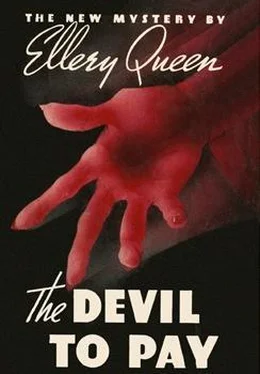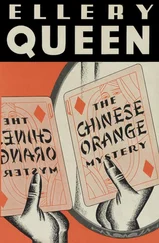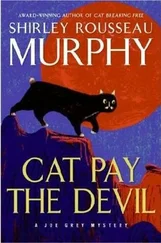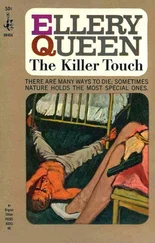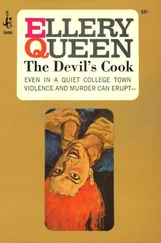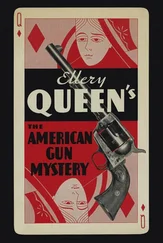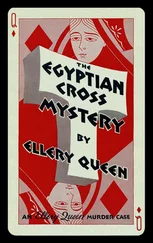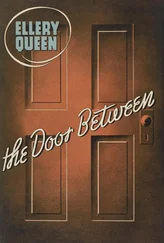“Who?” said the man.
“Ellery Queen.”
“Queen, Queen. Does he work here?” said the man, reaching for a directory.
“I believe he’s under that impression,” said Fitz.
“Oh, yes. Writer. Writers’ Annex, Room 25. Just a second.” He picked up his telephone.
Fitz stuck a cigar into the man’s mouth, said: “Cut the clowning. What d’ye think I am, a trade-paper ad salesman?” and went through.
He strolled along the cement walk before the open-air quadrangle of executive buildings, past the bootblack stand, and into the alley marked “‘A’ Street” alongside Sound Stage One. At the end of the alley cowered a long, lean, two-story building with a red-gabled roof and stained stucco walls.
Fitz mounted the steps to the open terrace and searched along the terrace until he found an open door with the number 25 on it.
It was a magnificent room, with two magnificent desks, a magnificent rug, a magnificent central fixture, magnificent draperies, and magnificent art on the walls. And it was magnificently empty.
A typewriter stood on a mahogany worktable opposite the door; a chair with polished arms magnificently etched into curlicues by some one’s penknife lay overturned on the floor before the table. From the carriage of the typewriter jutted a sheet of heavy bond paper, with words on it.
Fitz went in and read them. The words were:
“If a miracle should happen and somebody should walk into this hermit’s lonely desert cell, I am currently in the office of His Holiness Seymour A. Hugger, Grand Lama of the Writers’ Division of Magna Pictures, giving him a piece of what is left of my mind. For God’s sake, pal, wait for me.
ELLERY QUEEN.”
Fitz grinned and went out. On the way to the terrace steps he caught sight through a window of a long-legged literary person in slacks and a yellow polo shirt. The gentleman seemed fiercely intent on a toothpaste advertisement in Cosmopolitan . But then Fitz saw that he was asleep.
He returned to the Administration Building and hunted through the polished corridor until he discovered a door which proclaimed the presence of Mr. Hugger.
Opening the door, he found himself in a sort of glorified cubbyhole containing three large desks at which three beautiful young women sat buffing their fingernails, and a worried-looking young man who clutched a sheaf of yellow papers marked “Sequence A” which he was reading nervously.
“Yes?” said one of the young women without looking up, but Fitz opened the door lettered “Private” and strolled into Mr. Hugger’s domain without stooping to conversation.
Ensconced in a throne-like chair behind a dazzling cowhide-covered desk sat a chubby young man with thin hair and a benign demeanor. The room, the rug, the desk, the radio, the draperies, the bookcases, and the objets d’art were even more magnificent than their generic cousins in Room 25, Writers’ Annex. Moreover, Mr. Hugger was magnificent in his happiness. Mr. Hugger seemed to want every one to know that he was happy. Particularly the bearded, purple-visaged maniac who was waving his arms and scudding up and down the room like a Sunday yacht.
“If you’ll calm down for a minute, Mr. Queen,” Mr. Hugger was saying in avuncular accents as Fitz walked in.
“I’ll be damned if I will!” yelled Mr. Queen. “What I want to know is — why can’t I see Butcher?”
“I’ve told you, Mr. Queen. He’s very temperamental, Mr. Butcher is. He takes his time. Patience. Just have patience. Nobody’s rushing you—”
“That’s just the bloody trouble!” shouted Mr. Queen. “I want to be rushed. I want to work day and night. I want to hear a human voice. I want to engage in debates about the weather. What did you bring me out here for, anyway?”
“Excuse me,” said Fitz.
“Oh, hello,” said Ellery, and he sank into a ten-foot divan and plunged his hands into his beard.
“Yes?” said Mr. Hugger with an executive look.
“Oh.” Ellery waved his hand wearily. “Mr. Hugger, Mr. Fitzgerald. Fitz is managing editor of the Independent .”
“Newspaperman,” said Mr. Hugger, becoming happy again. “Have a cigar, Mr. Fitzgerald. Would you be kind enough to wait outside for a moment? Mr. Queen and I—”
“Thanks, I’ll wait here,” said Fitz genially, licking the end of Mr. Hugger’s cigar. “What’s the trouble, Master-Mind?”
“I ask you,” cried Ellery, bouncing up. “They brought me out here to write for the movies. They gave me twenty-four hours to get ready in New York, and they couldn’t even wait for me to get off the train. I didn’t have time to take a bath. Get him right down to the studio! they told my agent. So I hurried down here, full of alkali, with a running nose and a sore throat, and they gave me the Doge’s Palace to work in, a mountain of foolscap, a whole school of pencils, and the offer of a beautiful stenographer, which I refused. And what do you think happened?”
“I give up,” said Fitz.
“Sick as I’ve been, I’ve hung around here and hung around and hung around, waiting to be called into conference by his Lordship, Jacques Butcher, the producer I’m supposed to go to work for. You know what? After all that haste, I’ve sat in that damned lamasery for two solid weeks and the man hasn’t so much as telephoned me. I’ve called him, I’ve haunted his office, I’ve tried to waylay him — nothing. I’ve just sat on my rump praying for the sight of a human being and slowly going mad!”
“Mr. Queen doesn’t understand the Hollywood way of doing things,” explained Mr. Hugger quickly. “Mr. Butcher in his own way is a genius. He has peculiar methods—”
“Oh, he has, has he?” bellowed Ellery. “Well, let me tell you something, Your Majesty. Your genius has spent the past two weeks playing golf during the day and Romeo during the night with your ingénue star, Bonnie Stuart, so what do you know about that?”
“Come on out,” said Fitz, lighting the cigar, “and I’ll buy you a drink.”
“Yes, go on,” said Mr. Hugger hastily. “You need something to quiet your nerves. Mr. Butcher will get in touch with you very shortly, I’m’ sure.”
“You and Mr. Butcher,” said Ellery, impaling Mr. Hugger with a terrible glance, “are from hunger.”
And he stamped out, followed by Fitz.
Over the third Scotch-and-soda at Thyra’s, across the street from the studio, Fitz remarked: “I see you’ve got your voice back.”
“The sun fixed that, when he got around to it.” Ellery seized his glass. “God,” he said hollowly, and drained it.
“Sick of this racket already, hey?”
“If I didn’t have a contract I’d take the first train out of the Sante Fe station!”
“How’d you like to get mixed up in some real excitement, not this synthetic lunacy?”
“Anything. Anything! Give me that bottle.”
“It’s right smack down your alley too,” murmured Fitz, obliging as he puffed at Mr. Hugger’s perfecto.
“Oh,” said Ellery. He put down the bottle of Scotch and looked at Fitz over the siphon. “The Spaeth case.”
Fitz nodded. Ellery sat back. Then he said: “What’s up?”
“You know Rhys Jardin’s in the can charged with Spaeth’s murder, don’t you?”
“I read the papers. That’s the only thing I’ve had to do, by God.”
“You met his daughter, Valerie? Swell trick, eh?”
“Economically useless but otherwise a nice girl, I should say. Possibilities.”
Fitz leaned on his elbows. “Well, they’re up against it for dinero , and Val came to me this morning and asked for a job. I gave it to her, too.”
“Nice of you,” said Ellery. He wondered what had become of Walter’s money, but not aloud.
Читать дальше
